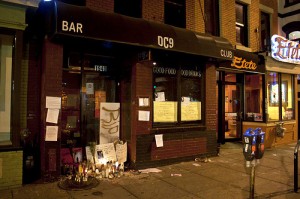DC9 Death Continues to Cause Pain, Confusion
In the early hours of Oct 15, 2010, Ali Ahmed Mohammed tried to enter DC9, a local nightclub located on a block unofficially known as “Little Ethiopia“. When he was denied entry, he picked up a brick and hurled it through the club’s window.
In response, five of the club’s employees chased Mohammed and, depending on which version of events you believe, either beat him to death or roughly restrained him, triggering a cardiac arrest.
After a witness reportedly claimed to have seen DC9′s employees attack Mohammed, Cathy Lanier, D.C.’s Chief of Police, characterized the situation as “vigilante justice“. The five employees from DC9 were arrested on murder charges that were eventually dropped. Mohammed’s death was ruled a homicide.
The story seemed to polarize parts of the city, with fans of the nightclub expressing support for DC9 and its employees while the city’s prominent Ethiopian community decried the attack on one of their own. Even today, five months after Mohammed’s death, some Ethiopian Americans are hurt and confused.
News of the controversy has spread as far as Addis Ababa, Ethiopia’s capital, where Abubeker Mohammed, a 29-year old D.C. cab driver with no relation to the man who died, was visiting when he first heard about it.
Mohammed said if the situation were reversed– if the club’s employees were Ethiopian and the man who died was white– then it “would be news all over the U.S. They’d never let them out of jail. Unfortunately, the guy who died was an immigrant. Ethiopian, black, Muslim…he had everything possible going against him.”
Hemen Solomon, a woman who lives in Columbia Heights added, “It breaks my heart that there’s no justice. Who can we turn to?…You struggle to make it here, to have a better life, and all you have is a dead body to take back to where we come from.”
A friend who knew Mohammed said that he would stand up for himself if needed, but was otherwise “harmless”.
“He was a friendly guy…Unless someone else provoked him, he wouldn’t start anything,” said Bekalu Biable, a local promoter and graduate student. “His family wants closure…If somebody killed him, we need justice.”
Some were shocked by the news that the city’s chief medical examiner reported that there was no visible trauma to Ali Ahmed Mohammed’s body.
“Remember?,” Solomon asks. “There was blood, there were witnesses? How about that? And the Police Chief herself said they beat him up?…It used to be in the local media, too. I don’t understand why we didn’t hear more.”
Bill Spieler is one of the co-owners of DC9. He was also one of the five people who were initially arrested for Mohammed’s death. Spieler said city officials should provide people with more information.
“I think parts of the community are a little confused about how things have gone because no one has told them otherwise…No public official has stepped up to the plate to explain things, either, whereas in the beginning, they had no problem coming out and saying something.”
The case is being “actively investigated” in conjunction with the US Attorney’s Office, said Police Chief Cathy Lanier, in a statement.
“Now that a final ruling has been issued by the Medical Examiner’s Office, the investigation into this crime can move forward with the goal of bringing the party or parties responsible to justice,” she wrote.
The US Attorney’s Office declined to comment.
As for Mohammed’s family members, they are “disappointed, but still optimistic,” said Andrew Laurence, a local community organizer and family spokesperson.
Laurence said that many Ethiopians immigrated to “escape political oppression, or violence from the police and military.”
“They left a police state, got amnesty here, and thought that they were coming to the land of justice. Now they worry that they can’t get justice here, so where can they get it?”
-
Blanonymouse Male
-
Abiy
-
Nacho
-
DC resident







